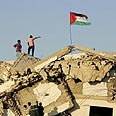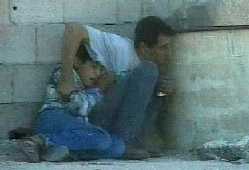
Palestinian flag in Gaza
צילום: איי אף פי
Palestinians carry Intifada scars
Gazans left with many painful memories; father of Muhammad al-Dura, 12-year-old killed at Intifada’s outset, says he hopes for eventual peace
With the completion of the Israeli pullout from the Gaza Strip, the Palestinians are left with many hard and painful memories from the long years of occupation, but also with new hopes and plans for the future
The last five years have been extremely difficult for the Palestinians of the Gaza Strip. According to recent statistics from Palestinians organizations, about 2,300 out of the 4,000 casualties of the Intifada, and 20,000 of the 35,000 wounded resided in the Strip.
One of the images that has most impacted world opinion and turned into a symbol of the last Intifada is that of young Muhammad al-Dura, the 12-year-old Palestinian who was killed during a shootout between Israeli soldiers and Palestinian gunmen in front of news cameras on September 2000.
Muhammad’s father Jammal, who was with his son when he was killed, still bears physical, as well as emotional scars from the incident. As hard as he tries, Jammal says he just cannot get over what has happened.
“God graced us with the ability to forget, but I just cannot. Each minute and each second of the day I see Muhammad dying in my arms,” he says.
The five years which have passed, as well as the Israeli pullout hav+e not dulled the pain, but Jammal is hopeful for a better future. “God willing the situation will improve and the two people live in peace with one another” he says.
‘I am not optimistic’
Samed Halil also suffered the consequences of the Intifada. One of the Fatah activists deported from the west Bank to the Gaza Strip on May 2002, Halil never met his third and youngest son Jihad, who was born just months after his deportation to Gaza.
“The Rais, Abu Mazen (Palestinian leader Mahmoud Abbas,) promised me in our last meeting that once the pullout is completed I will be reunited with my family. I have not seen them for three years… I have cried over this many, many times” tells Halil.
Only once did Halil get a chance o see his mother and brother, when they visited Gaza for a few days, but he has not seen his wife and kids in three years.
“I want to believe the promises of our leaders who said that after the pullout things will be better. To tell the truth, I am not optimistic,” Halil admits.
No more fighting?
Jabaliya in the southern part of the Strip is one of the regions most badly affected by the ongoing fighting during the last five years. Khaled abu-Saada, an ambulance driver from Jabaliya, still remembers each and every one of the dead and wounded he carried in his ambulance.
“Day and night we were evacuating more and more dead and wounded,” he recalls. “Neighbors, friends, families – I knew them all.”
But now Abu-Saada allows himself to be optimistic.
“God willing this pullout will signal the beginning of a new era, an era of peace, of stability and of a good life… Today I am happy, very happy,” he concludes.











